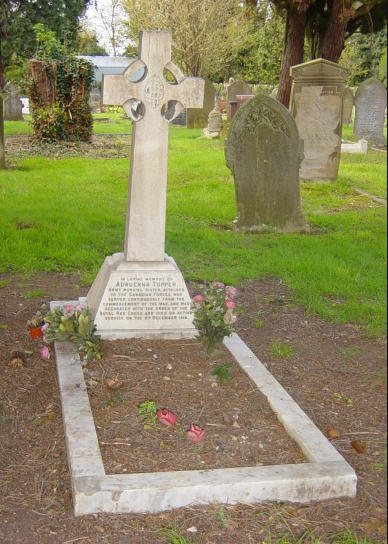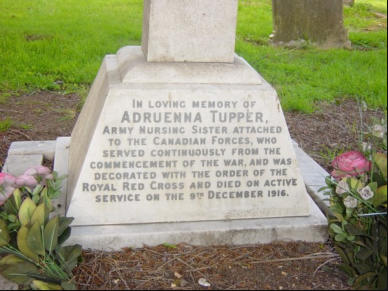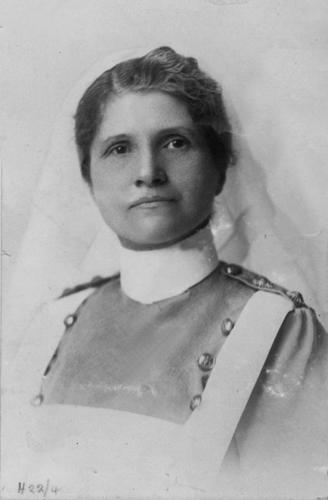

copyright © Wartime Heritage Association
Website hosting courtesy of Register.com - a web.com company
Wartime Heritage
ASSOCIATION
Remembering World War I
Yarmouth Connections
Name:
Adruenna (Addie) Allen Tupper
Rank:
Nursing Sister
Unit:
Canadian Army Medical Corps
Division:
No. 2 Canadian General Hospital
Honours and Awards:
Royal Red Cross, Class 2 (June 3, 1916)
Date of Birth:
October 13, 1870
Place of Birth:
Yarmouth, Yarmouth County, Nova Scotia
Date of Enlistment:
September 25, 1914
Place of Enlistment:
Quebec City, Quebec
Age at Enlistment:
43
Height: 5 Feet 4 Inches
Profession:
Trained Nurse
Marital Status:
Widow
Religion:
Baptist
Next of Kin:
(Mother) Mrs. Mary E. Trefry, Bridgewater, N.S.
Date of Death:
December 9, 1916
Age at Death:
56
Cemetery:
Uxbridge (Hillingdon) Cemetery, Middlesex, United Kingdom
Grave Reference:
Plot: UC. 8.
Commemorated on Page 175 of the First World War Book of Remembrance
Displayed in the Memorial Chamber of the Peace Tower in Ottawa on April 20
Memorial Stone in Brookside Cemetery, Bridgewater, NS
Commemorated on the Yarmouth Monument
Addie Tupper was the daughter of Mrs. Mary E. Trefry, of Bridgewater, Nova Scotia. For a time, as a younger woman, she lived in
Beaver River, Yarmouth County.
At the time of her enlistment at Quebec City, she was the widow of William Stanley Tupper. William died July 9, 1899.
In 1914, Addie Tupper was 54 years old. She was 5’ 4” tall, with dark brown hair, and brown eyes. When she enlisted she gave
her birth date as 1870, not 1860. If she had given her true age she may have been rejected for service.
She sailed with the First Contingent from Valcartier and arrived in England on October 16, 1914. She was placed on observation
duty in military hospitals. Her first Canadian military duty was at Salisbury. She was sent to France April 6, 1915 and served at No. 2
Canadian General Hospital where she had charge of 60 beds. She remained there until May 30 when the strain of heavy work caused
her health to fail and she was invalided to England. She remained in the Convalescent Home for Nursing Sisters.
Her next duty was at Clivedon and Shorncliffe.
She was then sent with other nurses in charge of 800 Canadian wounded soldiers to Canada for convalescence arriving in Halifax
November 15, 1915.
She returned to Bridgewater and remained there until December 2. During her time at home she visited various places in
western Nova Scotia and gave talks and lectures on the hardships undergone at the front. Large sum of money was raised for soldierly
comforts.
Returning to England in December she registered for duty at Ramsgate in the special Canadian Hospital; however, desiring to be
near the front she was sent back to France in February 1916.
In February 1916 she received word she had been awarded the Royal Red Cross decoration, granted only to those in charge of
the sick and wounded. The medal was presented to her December 2, 1916 by the King at Buckingham Palace, seven days prior to her
death.
Nursing Sister Tupper served in France until November 1, 1916 when she was sent back to England for winter duty at the
Canadian Hospital at Uxbridge. Shortly after the presentation of her medal she contracted a cold that developed into pneumonia.
She died on December 9, 1916 and was buried on December 12 with full military honours.
The following is the last letter written to her mother, received ten days following her death.
Adruenna (Addie) Allen Tupper



I got a letter from you yesterday sent back from France. One thing in it was heart breaking to me, but
I’m still hoping things were not as you feared they would be. You wrote that the young Corkum boy was
returning to Bridgewater from war; that the day was so rainy you feared he would have not but a few at the
station to meet him.
God grant your next letter will tell me he had a splendid reception. Any man, woman or child whose
health permitted should welcome these boys home. If not, I fear the home people have little realization of
what these boys go through. Day after day in trenches of mud and water, cold and weary. seeing their
companions, often their friends - killed, blown in pieces beside them, expecting the next shell will be their
death, perhaps seeing comrades buried by shell bursts or being buried themselves. Or, worse yet, seeing such
shell-shock that makes the boys blind, deaf, speechless or, often, insane.
I cannot understand the condition of weather that would keep people from crawling, if necessary, to give
the boys a “welcome home.”

© IWM (WWC H22-4



- World War I - Menu
- WWI Stories and Articles
- Photos - Yarmouth Soldiers
- Selection of World War I Songs
- WWI Casualties of Yarmouth, NS
- Those Who Served - Yarmouth, NS
- WWI Casualties Digby Co. NS
- WWI Casualties Shelburne Co. NS
- Merchant Mariners (1915) Yarmouth, NS
- Canadian Forestry Corps - Non Yarmouth Birth/Residence Enlistments
- US Draft Registry - Yarmouth NS Born


- World War II - Menu
- WWII Stories and Articles
- Telegraphist Air Gunners
- WWII Casualties of Nova Scotia
- US Casualties with NS Connection
- Far East/Pacific Casualties with NS Connection
- Merchant Navy Casualties Nova Scotia
- Nova Scotia WWII Casualties Holten Canadian War Cemetery
- D-Day Casualties - Nova Scotia
- CANLOAN Program Casualties - Nova Scotia
- Battle of the Bulge Casualties - Nova Scotia
- WWII Casualties Yarmouth NS
- Yarmouth Casualties - RCAF RAF Canadian Army WWII
- Yarmouth Co., Marriages WWII
- Casualties Non-Born/Residents with Connection to Yarmouth Co., Nova Scotia.
- WWII Casualties Digby Co., NS
- Non-Nova Scotian WWII Casualties Buried in Nova Scotia
- WWII RCAF Casualties Aged 16-18
- Brothers/Sisters Who Served - World War II













